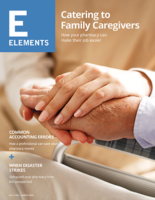Whether you use a reverse distributor or return products through your wholesaler, returning your pharmacy’s overstock, expired products or near-expiring products for credit can be a good source of revenue, instead of incurring a loss. When you understand what you can and can’t return for credit, you can stop common practices that make products non-creditworthy and you can optimize the way your pharmacy handles inventory. Here are a few general rules for getting the most out of your returns.
Minimize damages
While many manufacturers, reverse distributors and wholesalers understand that minor damages occur in everyday pharmacy practice, you can take certain precautions to ensure that the products you return don’t suffer damages that will make them non-creditworthy. If you package your own returns, be sure to use the right packaging to protect bottles (especially liquids), creams and other items. One cracked bottle of cough syrup could mean significant damage to other products in the package—and no return credit.
Keep packaging in like-new condition
Most manufacturers and wholesalers won’t accept defaced products, meaning the outside packaging of a product has been altered in some way. Unlike damaged products, you can completely avoid defacing products. Common forms of defacing products include writing on bottles or placing an inventory label on them to identify already opened products. A better way to identify these products is to place a colorful rubber band around the bottle.
Reduce partial products
Many manufacturers and wholesalers don’t allow you to return partial products for credit. Before you open an expensive, full item, take into consideration the amount of time until the expiration date. You might find it more cost-effective to return the full item nearing expiration than to open it and return it for partial or no credit.
Limit opening packages
Like partial products, many manufacturers and wholesalers also do not accept partial packages to be returned for credit. Partial packages include open products of multiple units within a single package. Try to avoid routinely breaking apart multiple unit packages when you receive them—that way you’ll still have the option to return them for credit.
Avoid repackaging
When you repackage a product, it immediately becomes non-creditworthy—even in the event of a recall. Before repackaging a product, make sure doing so is cost-effective. If you repackage products often at your pharmacy, consider buying those products in smaller package quantities to reduce the chance of the product expiring before you use it all.
Check expiration dates
Many manufacturers and wholesalers only credit for short-dated products. A good rule is to pull products six months before expiration to ensure that you’ll receive credit. Other good practices include performing quarterly returns, walking the shelves more often to identify products that are nearing or past expiration and rotating your stock regularly. If you have expired products, some manufacturers, wholesalers or reverse distributors will accept products after expiration—but they must fall into a certain window of time, usually within six months or less of expiration.












